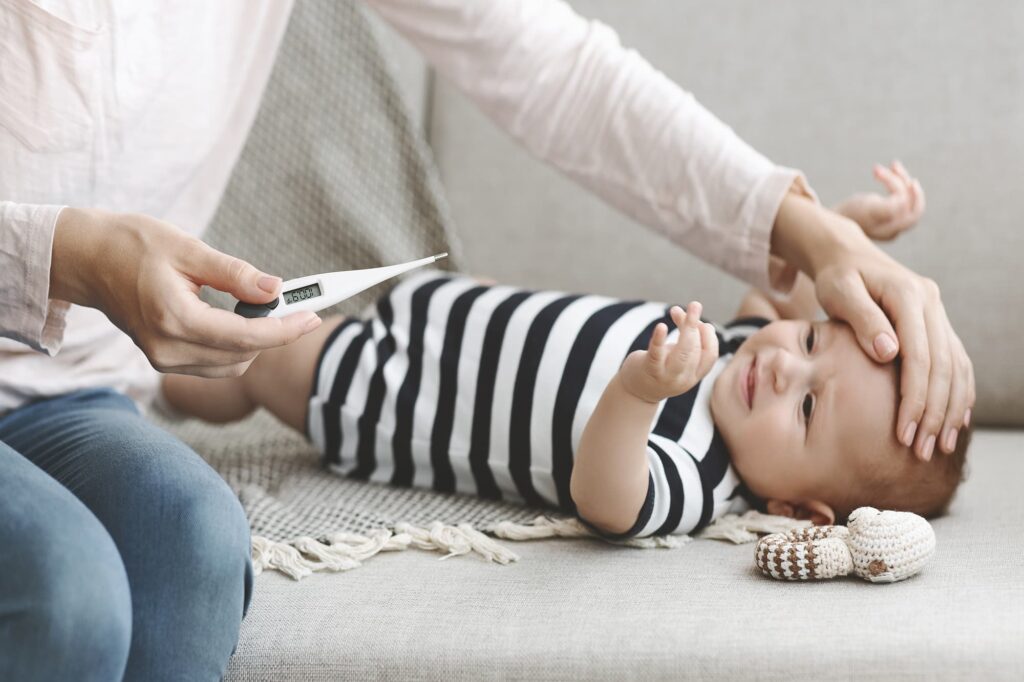Babies can catch a cold any time of year and at any age, and there’s no infant cold medicine to make it all better. Babies who are around older children are at a greater risk of catching a cold or the flu. Common colds in babies are not dangerous, but they can turn into pneumonia or croup, which can be dangerous. Any illness in a baby under 2 or 3 months old is a reason to call your pediatrician, especially if they’re running a fever.
Symptoms of colds in newborns
A stuffy or runny nose is usually the first sign that a baby has caught a cold. Other symptoms include:
- fussiness
- fever
- coughing, especially at night
- sneezing
- reduced appetite
- difficulty breastfeeding or taking a bottle because of nasal congestion
- trouble falling or staying asleep
Flu
Babies with the flu usually have diarrhea, vomiting and chills in addition to common cold symptoms. Babies likely have symptoms you can’t see and that they can’t tell you about, including muscle or body aches, headaches or sore throat. If you suspect your baby has the flu, contact your pediatrician immediately.
Treating the cold at home
Home treatment for a newborn’s cold consists mostly of helping them feel comfortable. Here are some tips:
Do
- Give plenty of liquids, including formula or breast milk. A small amount of water may be offered to babies older than 6 months.
- Use saline drops and a suction bulb to suction out nasal mucus.
- Moisturize the air with a humidifier. Ask if your doctor recommends warm or cool mist. Older curious children could get hurt by warm mist humidifiers.
Do not
- Antibiotics do not work on viruses and should not be used to treat a cold.
- Over-the-counter fever reducers, including Infants’ Tylenol, are not recommended for babies younger than 3 months unless directed by a pediatrician. Do not give any type of OTC medication to a baby under 1 year unless your pediatrician recommends it.
- Never give aspirin to a baby or child.
- Cough and cold medications aren’t recommended for children younger than 2 years.
- Vapor rubs, even those formulated for babies, can irritate airways. Don’t use these on the skin or in a vaporizer.
- Don’t let babies sleep on their stomachs, even if they have congestion.
Tips to stay healthy
You can’t protect your baby from every illness, but you can help avoid exposure to some germs. Here are some tips for cold and flu prevention:
- Wash your hands often and ask visitors to wash theirs.
- Avoid contact with people who are sick and wipe down surfaces that have been touched by people who are coughing or sneezing.
- Ask people who have contact with your baby to cough or sneeze into their elbows, not their hands.
- Limit your baby’s contact with older children if you can.
- Make sure the adults and children around your newborn are current on their pertussis (whooping cough) vaccine and flu shots.
Pediatric Partners has three locations to better serve our patients. The Evans office is at 411 Town Park Blvd.; the downtown Augusta office is at 1303 D’Antignac St., Suite 2600; and the new Grovetown office is at 5135 Wrightsboro Road. For more information about Pediatric Partners, call the office at 706-854-2500, visit PedPartners.com, or follow the Pediatric Partners of Augusta Facebook page.

